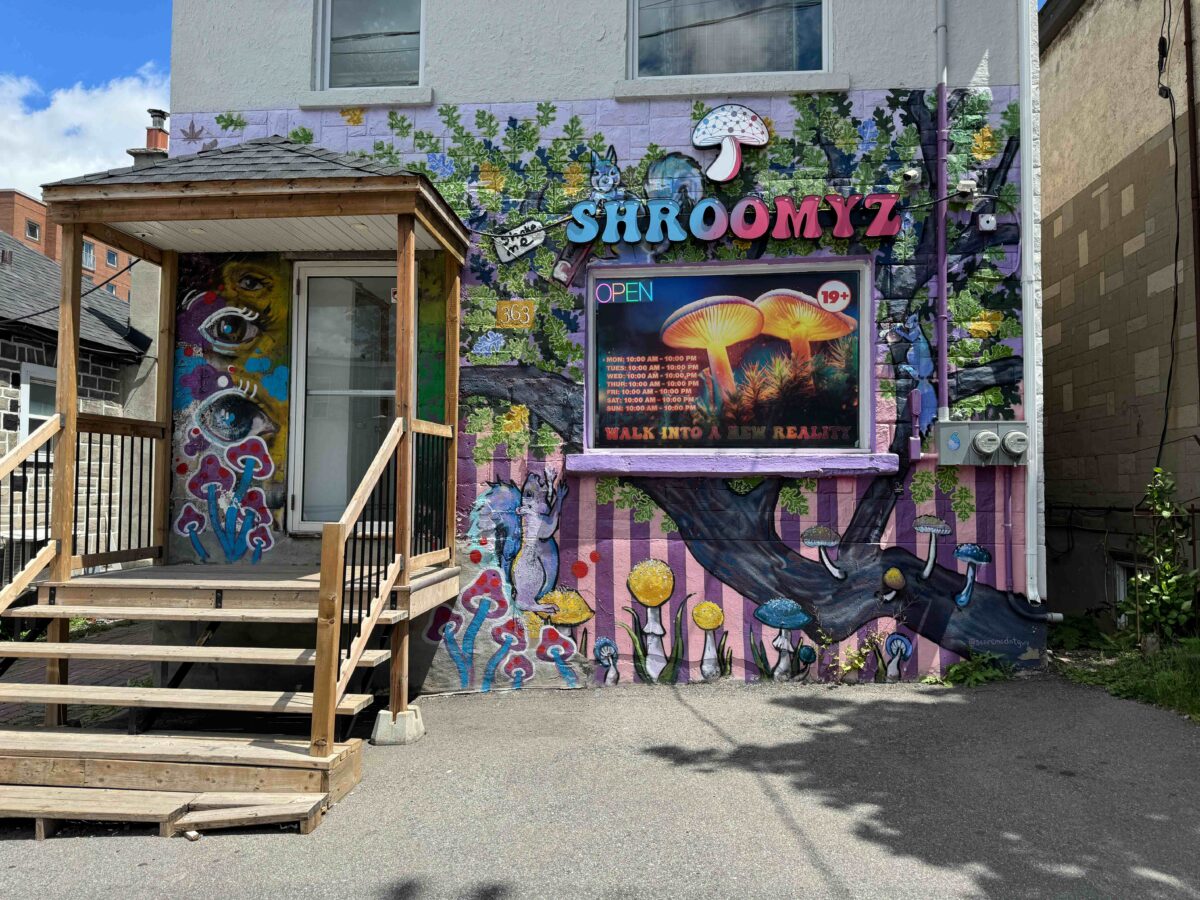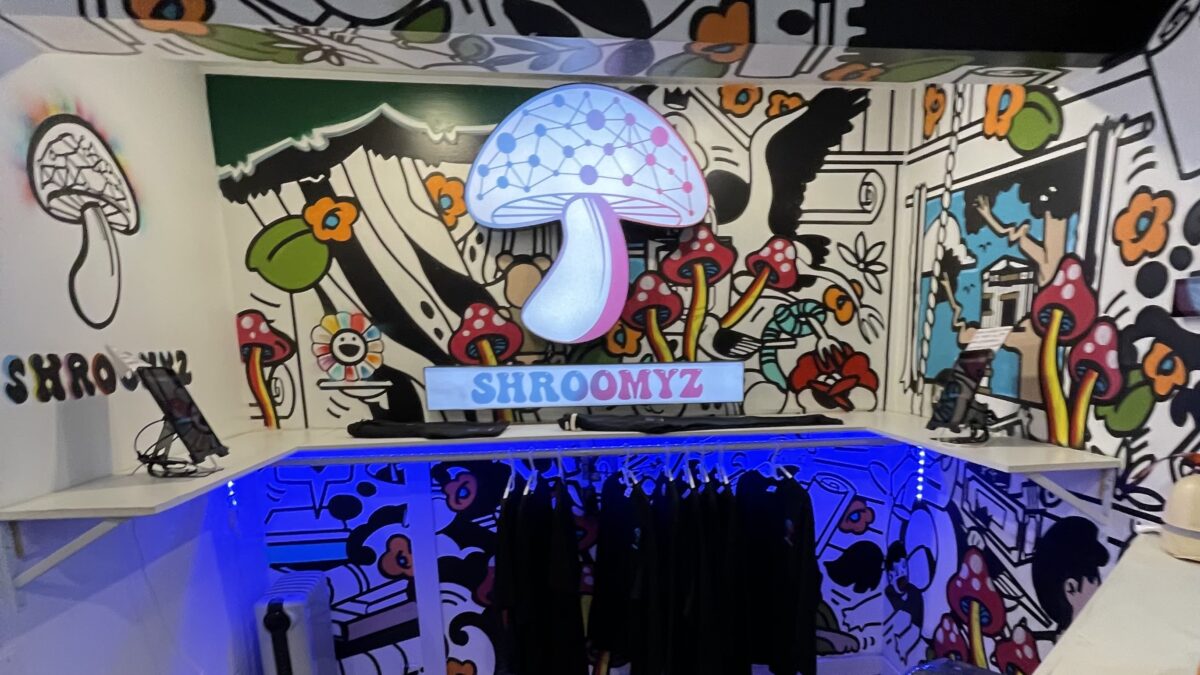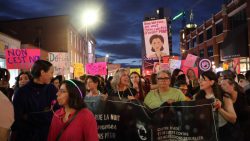As Canada wrestles with a growing demand for access to magic mushrooms by people craving mental health improvement, Capital Current’s Victor Vigas Alvarez takes a four-part look at the ins and outs of this growing debate. Today: The business of psilocybin.
There is a store on Preston Street that sells illegal mind-altering magic mushrooms.
Despite operating outside the law, Shroomyz is one of at least eight such shops in Ottawa, making them a conspicuous sign of a growing obsession with the hallucinogenic compound psilocybin.
From the outside, that face is a small house plastered with whimsical, colourful mushrooms on the front. To enter, you are buzzed in.
There is a display showing off the varieties of psychedelic mushrooms offered for sale. They have dried mushrooms, chocolates blended with psilocybin extract and even infused peanut butter.
If you want to buy, employees will ask about your experience with cannabis and other substances before making recommendations based on potency. Customers create a digital profile using their name, email and birthdate. They also have to select a mental health reason for purchasing some mushrooms. If you leave them a five-star review on Google, you’ll get a discount on your purchase. It’s cash only, please.
The shop in Ottawa’s Little Italy is one outpost in a worldwide phenomenon of scientific interest and public consumption.
I think (mushroom stores) honestly, are better than people getting it from the streets where you kind of don’t know exactly what’s going on. I’ve not even really worried about the street ones.
Anonymous user of magic mushrooms
For example, in 2024, the world’s leading science newswire — Eurekalert! — shared several peer-reviewed studies touting the health benefits of magic mushrooms; announced the European Union’s awarding of €6.5 million Euros to a 19-member, nine-country consortium of researchers to probe the potential of psilocybin in psychedelic therapy and highlighted a Laval University survey showing 79 per cent of Canadians approve the use of magic mushrooms for patients struggling with end-of-life mental health issues.
Eurekalert! has also, over the first six months of this year, flagged one U.S. study that shows skyrocketing rates of law enforcement seizures of psilocybin mushrooms and another showing a spike in psilocybin-related calls to U.S. poison centres after several American cities and states began decriminalizing the drug.
Magic mushrooms — formally known as psilocybe cubensis — are a naturally occurring fungi that can produce hallucinations, heightened emotions and distortions of space and time when consumed.

The mushrooms are said to open the user up to intense emotional experiences, hallucinations and euphoria. Many users report feeling closer to nature, themselves, and people they love afterwards.
You can also have a “bad trip” with effects such as paranoia, panic attacks and anxiety. If you have a history of certain mental health issues such as schizophrenia — these hallucinogens can trigger psychosis.
Canada declared psilocybin mushrooms illegal in 1982 as a schedule 3 controlled substance under Canada’s Controlled Drug and Substance Act (CDSA).
Across country, police are enforcing the law. They have raided and shut down some of these shops — only for some to quickly reopen, sometimes within hours. But these efforts are being questioned. For example, in an Ottawa Citizen article from July 2023, columnist Bruce Deachman wrote: “I’d like to think that Ottawa police have more significant fish to fry in the world of illegal drugs.”
In a statement, the Ottawa Police Service told Capital Current, “(OPS) reviews and assesses drug complaints on an individual basis to determine the appropriate course of action, which may include further investigation and enforcement. The Ottawa Police Service Drug Unit does not comment on specific current or future investigations and enforcement.”
It’s the same thing that happened with cannabis. … People want to try mushrooms and people want to try psychedelics. They point to a failure of our medical system.
John Gilchrist, of medical psilocybin advocacy group TheraPsil
John Gilchrist, communications manager for medical psilocybin advocacy group TheraPsil believes the mushroom stores are responding to a need.
“It’s the same thing that happened with cannabis … People want to try mushrooms and people want to try psychedelics. They point to a failure of our medical system.”
A former senior government official, who spoke to Capital Current on background, said they support decriminalization or recreational legalization instead of unregulated shops.
“With any illegal source, it’s not regulated. You don’t know whether you’re getting what you thought you were getting.”
“We don’t eat cabbage that we don’t know whether the farmer didn’t use certain pesticides …and I think that’s one of the hard things about whether you’re a drug dealer or running a mushroom shop. I don’t think you want to represent the reputation of having poisoned people.”
This past February, Dr. Ishrat Husain, a psychiatrist studying psilocybin at the Centre for Addiction and Mental Health in Toronto, told CBC Radio that the purity of the mushrooms sold at illegal dispensaries is hard to know.
While there are companies such as Filament Health in B.C. with legal permission to grow pharmaceutical-grade psilocybe cubensis to be administered in clinical settings, that’s not the case with other suppliers.
John Gilchrist says that the inexactness of the products sold in illegal shops creates “unwitting participants (who) might just go home and eat a couple, they might just eat a little bit, but they might never be the same again.”
When consumed by people with certain mental health conditions, psychosis can occur. Some can suffer from Hallucinogen Persisting Perception Disorder (HPPD), where the user can continue to experience recurring visual distortions after the “trip” is over.
Still, one Shroomyz customer, who wished to remain anonymous, told Capital Current that they trust mushroom shops more than a dealer on the street.
“I think (mushroom stores) honestly, are better than people getting it from the streets where you kind of don’t know exactly what’s going on,” they said. “I’ve not even really worried about the street ones.”
Dana Larsen, a Vancouver-based advocate and owner of three psychedelic dispensaries, told Capital Current he sources his products from local growers in B.C.
Mushrooms aren’t really that hard to grow. To grow immaculate perfect mushrooms is a challenge … Anybody can grow a cannabis plant, they call it weed for a reason, but to grow like an immaculate world class cannabis plant takes a bit of knowledge and effort, and with mushrooms, it’s the same.
Dana Larsen, owner of three psychedelic dispensaries in Vancouver
In March, Vancouver City Council reinstated the business licence of one of Larsen’s psychedelic shops after it was raided by police — making it the first store in Canada licensed to sell such products.
Larsen is also the founder of Get Your Drugs Tested, a Vancouver community service that offers drug testing for free. While the facilities can’t test organic substances like cannabis or magic mushrooms, Larsen says that his shops have their own testing and analysis regimen to ensure their products are safe to consume.
“Mushrooms aren’t really that hard to grow. To grow immaculate perfect mushrooms is a challenge … Anybody can grow a cannabis plant, they call it weed for a reason, but to grow an immaculate world class cannabis plant takes a bit of knowledge and effort, and with mushrooms, it’s the same.”
At minimum, the proliferation of stores create normalized exposure to the existence of psychedelics.
Many have said that what is happening with the shops mirrors what occurred with cannabis dispensaries before Canada legalized weed for recreational use in 2018.
“It’s just exploding, because you can get your hands on it super easily. It’s just textbook cannabis. It was similar to stores with weed before it was legalized,” said Gilchrist.
Larsen, is also a longtime legal cannabis advocate, operated cannabis dispensaries before it was legal. “The cannabis medical aspect with the dispensaries was a prerequisite to get to legalization.”
In municipalities, these stores are generally set up under generic retail licenses, not explicitly for the purpose of selling illegal substances.
These dispensaries are great for young people who want to do a trip and try these mind-altering substances. At the end of the day, it’s slightly counterproductive to organizations that want to get psilocybin legalized in a therapeutic and medical context.
Celia Bildfell, website lead for the Multidisciplinary Association for Psychedelics Studies
Celia Bildfell, website lead for the Multidisciplinary Association for Psychedelics Studies (MAPS) Canada, believes the shops take away from the mission of therapeutic use. MAPS Canada is a non-profit group that works to research and advocate for the safe use of psychedelics like psilocybin. They work alongside other researchers, advocacy groups, and government, to administer studies, and distribute concurrent information about psychedelics research.
“These dispensaries are great for young people who want to do a trip and try these mind-altering substances,” said Bildfell.
“At the end of the day, it’s slightly counterproductive to organizations that want to get psilocybin legalized in a therapeutic and medical context.”
Paul Lewin, a lawyer with Lewin & Sagara LLP said illegal mushroom shops are performing an act of “civil disobedience (and as such) they help move the ball forward.”
Lewin is defending a spokesperson for a London, Ont. mushroom shop, FunGuyz, charged with possession for the purpose of trafficking under the CDSA in the Ontario Court of Justice. He has plead not guilty, claiming freedom of thought under section 2(b) of the Charter of Rights and Freedoms.
A favourable decision could open a path to the end of prohibiting possession, growth, and movement of psilocybin.
Lewin also disagrees that access to psilocybin should be exclusively through doctors.
In Lewin’s view, ordinary people, not just those with conditions like End-of-Life anxiety or Treatment-Resistant Depression could also benefit from using magic mushrooms. He says psychedelics are a part of Canadians’ freedom to think how they want.
“Psychedelic people who are saying this is only medicine, they know better and they should stop it.”




